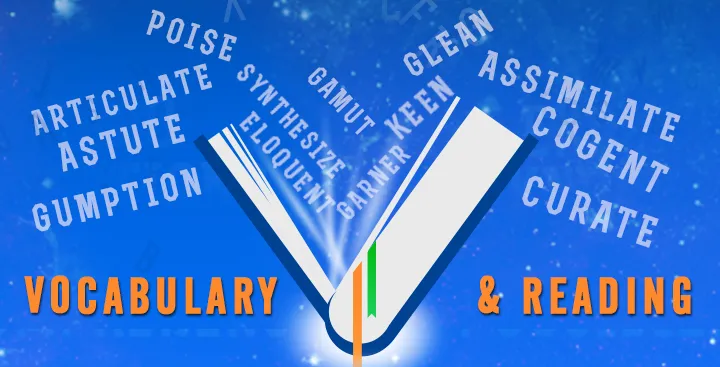Have you ever become lost in a story, pulled along effortlessly by endearing characters or fascinating research? Felt as though you were really a part of the adventure tale or the pop culture treatise you held in your hands? We’re guessing the answer is yes.
We’re also guessing you’ve had the experience of being rocketed back to reality when you come across a word you don’t know. Perhaps you puzzle over it for a moment, dog-ear the page or save the link, head straight to the dictionary or haphazardly guess the meaning and move on.
No matter what, you’ve been pulled out of the moment, and it’s all because of the inextricable link between vocabulary and reading.
Reading Comprehension = Vocabulary Comprehension
The definition of reading comprehension is very simple: the ability to read, process and understand text. If you comprehend what you’ve read, you can make sense of the text or even tell someone else what occurred with a high degree of accuracy.
It should be obvious why vocabulary comprehension is so important to this process. If you don’t understand the words you encounter, you can’t make sense of the text as a whole. Studies point to the inextricable link between these two skills from the earliest ages, when children are just starting to learn to decode text.
The same holds true for older readers. Another study demonstrated that English as a Foreign Language students were more proficient in both vocabulary and reading comprehension in their native language, and of reduced proficiency in both vocabulary and reading comprehension in English. As one rises, so does the other.
Types of Vocabulary and Reading
Vocabulary is not as simple a term as you might think, either. It’s not enough just to know a word exists or have a passing familiarity with it. Both breadth and depth matter when it comes to comprehension. When you have an expansive vocabulary (breadth), you are able to gracefully navigate encounters with a much wider variety of words. On the other hand, a thorough understanding of each individual word (depth) enables you to dissect the subtle nuances of language, such as the multiple, contextualized meanings many words contain.
Simply: If you know a lot of words, and know them well, you’re likelier to be more successful in learning a second language or deepening your native English.
The success doesn’t stop there, though. According to City Journal, a positive correlation exists between a student’s 12th-grade vocabulary size and the likelihood that they will graduate from college. It’s also correlated with a higher income, which makes sense: If you effectively comprehend what you read, you’re also better equipped to write, listen, speak and learn a variety of subjects.
Reading Comprehension in the Real World
Reading doesn’t stop when you leave school. While this fact might feel burdensome at times, it’s actually a very fortunate truth. It means people in most careers, and probably you yourself, have a high degree of intrinsic motivation to succeed – and reading more effectively gets you there faster.
Having a large enough vocabulary to comprehend prose is crucial in a huge variety of industries, and not just the commonly cited professions: doctors, lawyers or journalists, for instance. It matters in construction and retail, teaching and tax preparation, hospitality and real estate. The level of reading comprehension – and thus your effectiveness at work – is directly related to your vocabulary.
Building a Virtuous Cycle Between Reading and Vocabulary
Thus far we’ve discussed the downsides of a limited vocabulary, and what that means for reading comprehension. The good news is that the two also have a positive correlation: As vocabulary improves, so does reading comprehension. Likewise, as your reading comprehension improves overall, you’re then better able to make sense of unknown words as you come across them. When you know the majority of the words you read, determining a word’s meaning from context – and therefore moving on quickly – becomes simpler.
Reading also becomes more enjoyable, meaning you’re likelier to do it more often. If you’re one of the many who currently only reads about a book a year, rest assured that you can build a habit of reading consistently. It starts with vocabulary, so that the experience becomes seamless rather than a slog.
Contrary to what you may have heard, learning vocabulary doesn’t require intensive study or “word of the day” emails that stick in your brain for a few hours at most.
That’s where Vocabulary Zone comes in. Our mission is not to help you spout five-letter words or read Moby Dick tomorrow. Instead, it’s to simplify your everyday life and communication in work, at home and while engaging in hobbies. Reading comprehension is about having a deep understanding of the meaning of individual words, as well as broad access to the richness of the English lexicon as a whole. And yes, our expert-backed program does just that.
Written by Greg Ragland, President, CEO of CommEdge LLC producers of Vocabulary Zone and the corresponding Vocabulary Certifications: College Preparedness, Ph.D. Vocabulary and Executive Level Vocabulary
